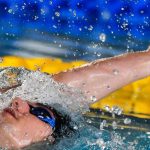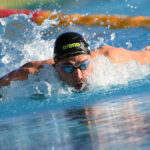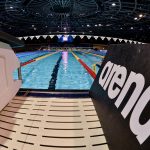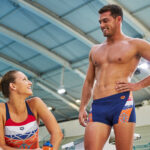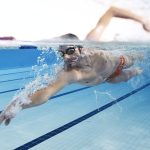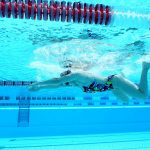4 skills that swimmers perfect that are seemingly unrelated to swimming
Over the years as an athlete, you develop a skill set that is unique to your sport. Fast transitions from one stroke to another, precise flip turns, and efficient stroke rates are just a few swim-related examples. However, there is an equally real, albeit much less obvious, set of skills that you also tend to develop which are seemingly unrelated to the sport at all. Let’s dive into some of them (see what I did there?)…
1. Intermittent conversations.
Swimmers have perfected the five second conversation since, unlike other sports which have more rest time in between repetitions, we tend to be on the go during sets. Long aerobic sets with short breaks also tend to be the ones that lead to the most amount of boredom, so we have to find ways to entertain ourselves and our team mates. Strategically conversing with the person in the lane over from you is truly a delicate art form because it often means having time to only slip in a couple of words at a time, with your team mate having to string the sentence together bit by bit. “Talking this way” … *50 metres later* “Can get a little bit” … *100 metres later* “Confusing at times” … Hey, you get the point, right? Short break times make for skilled conversationalists who know how to sneak in just the right amount of words (in between trying to catch our breath, of course!).
2. Strategic tanning.
We’ve definitely all seen the training camp horror stories where your friend has an unfortunate one-piece tan line or a goggle tan the size of scuba goggles (let’s be real… I am that friend. It’s me). But for the most part we tend to get a handle on the situation and adopt methods of avoiding any potentially embarrassing tans. There’s the quick fix of wearing a training two-piece of course, which ensures that your stomach doesn’t glow fluorescent compared to the rest of your body. And then there’s the good old cap adjustment; my teammates and I wear our bathing caps so high up on our head it’s practically slipping off, but it means not having a thick white tan line across our foreheads so I’d say the good outweighs the bad here. And then there’s the tricky racoon-eyed goggle tan that is especially daunting for backstrokers who are constantly facing up towards the sun… Though much harder to avoid, there are some tricks of the trade such as taking your goggles off in between repetitions, or removing them altogether for longer kick sets which can help alleviate the scuba-diver look around the eyes.
3. Drying things off.
Yes, I literally mean making things less soaked. Often in the hectic post-practice rush to get ready for school or work in the mornings, a nice gentle towel pat down and blow dry is out of the question. You’ve got to instead cram your damp legs into jeans (or, more realistically for me at least, sweatpants) after a quick run over with a towel, and engage in your second arm workout of the day by aggressively towel-drying your hair into a semi-acceptable fashion. Seriously, I have never seen a group of people get ready as fast as a pack of swimmers in the locker room trying to get somewhere on time (unless of course you count a group of swimmers being told there’s food waiting for them). I’m not just talking about drying off ourselves, either… take a look into any hotel room during swim competitions and you will find bathing suits, damp deck clothing, and soaked bags strategically and creatively hung off of lamps, bed frames, and every single door knob in an attempt to prep for the next session. And even when there’s simply no time to spare to dry off, swimmers are readily willing to rock a messy wet bun, or (much less willingly) a damp training suit.
4. Balance.
I don’t mean this at all in the literal sense, since swimmers are notoriously bad at anything requiring grace or stability on land, but I do mean this in the more abstract way that we intricately balance different aspects of our lives. Dedicating so many hours of our week towards the pursuit of athletic goals can be an extremely rewarding decision, but it also means having to make serious life adjustments in order to keep up with external demands. As a student-athlete who also works part-time I can firsthand attest to the fact that sometimes it seems as though there just aren’t enough hours in a day to get everything done. But organizing my time, managing my social and personal endeavors, and slotting out specific times in each day dedicated to homework are habits that have resulted from years of trial and error. Nonetheless, they prove to be an invaluable skill which I know will serve me well in life outside of the sport, out in the (*gasp*) ‘real world’. And that, my fellow swimmers and swammers, is perhaps the most important skill that sports as a whole can teach us.
Photo credit: Alessandro Rocchi
Written by:
Rebecca Gillis
Hi! I’ve been swimming competitively since I was eight years old, and enjoy documenting the ups and downs of life as an athlete. Most of my days are spent on the pool deck, since I also work as a coach for young children, and as a lifeguard. Other than that, I’m a full time student and, like so many of my fellow swimmers, a food/nap enthusiast.
